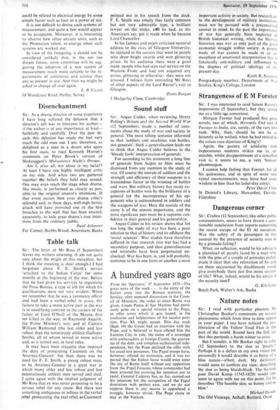Sound stuff
Sir : Angus Calder, when reviewing Henry Pelling's Britain and the Second World War (12 September), made a number of com- ments about the study of war and society in general. The most telling sentence informed us that 'soldiers and machines win battles, not generals'. Such a generalisation leads me to think that Angus Calder believes in the 'bloody fools' interpretation of generals.
For according to his statement a long line of generals from Scipio to Slim must be dismissed from any mention in the study of war. Of course the morale of soldiers and the strength and efficiency of their weapons is a tremendous factor in the winning of battles and wars. But military history has many ex- ceptions of battles won by the brilliance of a general (or the incompetence of his op- ponent) who is outnumbered in soldiers and the weapons of war. Here the morale of the army is of the utmost importance, and the most significant part must be a supreme con- fidence in their general and his generalship.
Angus Calder in his review shows that for too long the study of war has been a poor relation to that of history and its offshoot the 'social sciences'. War studies have therefore suffered in that research into war has had a secondary purpose, and thus generalisations and mistruths have been perpetuated un- checked. War has been, is, and will probably continue to be in one form or another a most
important activity in society. But research in. to the development of military institutions must not be pursued with a preconceived answer in mind. In the past the importance of war has generally been neglected in British historical writing, while the Marxist historian sees war as only part of the great economic struggle within society.- A proper study of war cannot be made in an at- mosphere of emotional interpretation that is fanatically anti-military and influenced by the dogmas of political ideology of the present day.
Keith R. Simpson Postgraduate member, Department of War Studies, King's College, London


































 Previous page
Previous page